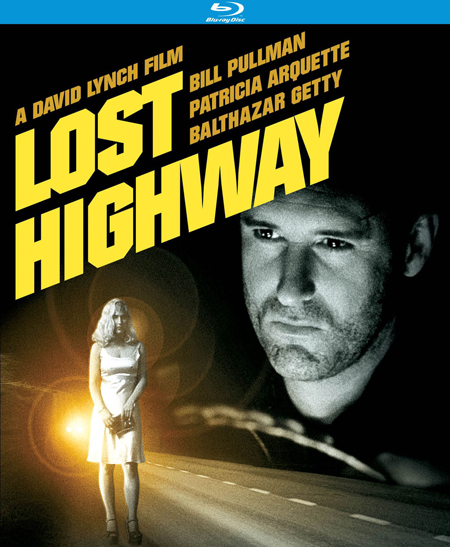
“A
FEAR OF FUGUESâ€
By
Raymond Benson
The
U.S. has finally seen a Blu-ray release of David Lynch’s challenging 1997 feature,
Lost Highway (up until now it has been available only on DVD and
less-than-ideal-quality imported Blu-ray editions from various countries.) Kino
Lorber unleashed this disturbing and surreal work of art from the heir apparent
of Luis Buñuel, and it’s a doozy.
Lynch
described his 1997 feature, Lost Highway, as a “psychogenic fugue,â€
which is a fancy term for a dissociative disorder. The story concerns musician
Fred Madison (Bill Pullman), who may or may not be having marriage trouble with
his beautiful wife, Renee (Patricia Arquette). An outside force seems to be
watching and harassing the couple by leaving intimate videotapes of themselves
on their doorstep. Throw in some nightmares and the appearance of a
“mystery man†(the very creepy Robert Blake) with powers that could only exist
as dream logic, and Fred eventually loses it. Suddenly he’s arrested for
killing his wife. But then—uh oh—while he’s sitting in a jail cell, he becomes…
someone else. The cops find Pete Dayton (Balthazar Getty) in Fred’s
place. Puzzled, they let Pete go, since he’s not the man they want. Now there’s
a kind of alternate universe thing going on, because Patricia Arquette now
plays Alice, the mistress of the cruel Mr. Eddy (Robert Loggia), who may in truth
be a porn producer named Dick Laurent.
Confused?
Many audience members were at the time of Lost Highway’s initial
release. The picture marked the first in what might be called the “fugue
trilogy†(the other parts being Mulholland Drive and INLAND EMPIRE),
in which main characters become other people during the flow of the tales.
After a second or third viewing and examining Lynch’s narrative conceits in the
other movies, one can get a sense of what it’s all about. And I’m not
going to tell you. Just know that Lost Highway is about a man who
murders his wife, and he is unable to live with himself—or inside his own
mind—because of it. The film generates a good amount of dread, and it is pure
Lynch. It marks a transition from earlier, more narrative-friendly pictures, to
more dreamlike, experimental works of art that defy description—other than that
they are “David Lynch Films.â€
When
the Kino Lorber release appeared, Lynch made the news by denouncing it,
claiming that he disapproved of the transfer and that he wasn’t consulted. Kino
Lorber fired back with a response. (Click here to read.)
While
we at Cinema Retro don’t want to dispute Mr. Lynch’s opinions on the movie’s
Blu-ray release, we can say that the Kino Lorber edition is the best we’re
going to get at this time. It looks darned good even without the intended restoration/transfer
from the original negative. The dual-layered BD50 disk, with its 5.1 surround
and 2.0 lossless audio, sure beats the old DVD and import versions. There are
no supplements, although the picture has chapter breaks (something Lynch has campaigned
against with the release of his pictures on home video).
The
final verdict—until, say, Criterion, or another company properly uses the
original negative and has Lynch’s approval, then the Kino Lorber release is good
enough. Sorry, David, we just want the movie!
(Although David Lynch did not approve the audio commentary by Tim Lucas for inclusion on the Blu-ray, Lucas has made it possible for fans to download the commentary for free. Click here for info.)
CLICK HERE TO ORDER FROM AMAZON
